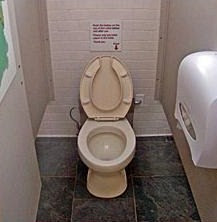
The wishing well community garden in the South Bronx soon will install a new toilet friendly to the environment but with a twist - the waste will be composted, and will end up a few feet away in plant and vegetable beds tended by students from nearby Public School 333.
Not everyone is thrilled about the cutting-edge composting toilet planned for Rev. James A. Polite Ave.: One garden volunteer doesn't want schoolchildren using "human manure" - and some scientists say the fertilizer could be deadly.
"If you have a person who is susceptible, like a young child, or an older person with a compromised immune system, it won't take much of a dose for bacteria - E. coli 157, for example - to create a major, major problem: shutting down of kidneys, possibly death," said Steve Reiners, a Cornell University professor who studies food safety issues related to manure and compost.
"Would I use it in my vegetable garden? No, I would not."
Bob Bastiam, a senior environmental scientist at the federal Environmental Protection Agency, said that while composted fertilizer could be a good soil supplement, it should be treated like raw, unprocessed manure and used for "roses rather than strawberries."
Bastiam added he wouldn't use it where kids play, noting that no soil is pure.
"It goes back to washing your hands and good hygienic practices," he said.
 The toilet is produced by the Clivus Multrum company, which says it is safe.
The toilet is produced by the Clivus Multrum company, which says it is safe.The fertilizer needs at least a year of composting, said Don Mills, a spokesman for the company. He added that privately produced studies found "the compost that comes out of the toilet has a bacterial content that is equivalent to that found in topsoil."
Still, Mills said, "We're not prepared to say that there is zero risk.... Kids shouldn't be putting dirt in their mouths, but they do, of course."
Pleasant Park in East Harlem got a Clivus Multrum toilet in December 2005.
That toilet is used mostly in the summer, peaking at 120 times a week. After two years, the toilet is at about one quarter full, according to Hannah Riseley-White, who educates community gardeners about composting toilets for the Green Guerrillas, an environmental group.
She said that when the toilet is full, the gardeners at Pleasant Park will seek help from the New York Restoration Project to test the composted waste before using it.
Riseley-White said the gardeners are "comfortable and happy" with the toilet, and thrilled that it uses almost no water.
At the Wishing Well, most gardeners are in favor of using the toilet compost. But Jerry Mojica, a longtime volunteer, doesn't want to put what he calls "human manure" in the garden, where he grows vegetables with the schoolchildren.
Mojica, though, is in the minority.
"Some people don't get it," said Kevin Higgins, who volunteers at Wishing Well along with his wife, Jeannette, and supports using human fertilizer.
"[The fertilizer is] good for anything," Higgins said. "Vegetables, trees - anything."
from The New York Daily News